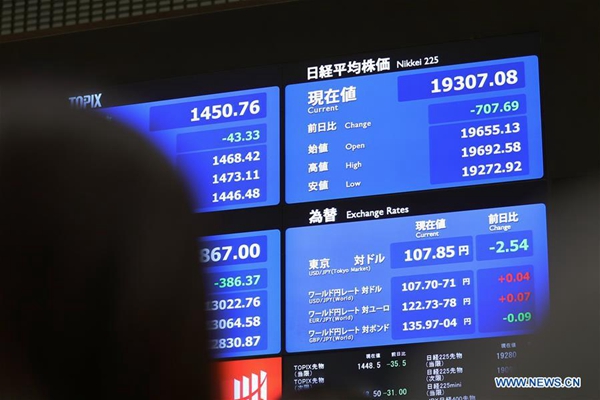The problem with Abenomics
- By Michael Roberts and Heiko Khoo
 0 Comment(s)
0 Comment(s) Print
Print E-mail China.org.cn, February 26, 2020
E-mail China.org.cn, February 26, 2020

Japan's real GDP dropped sharply in the last quarter of 2019 and the economy seems to be entering a new "technical"recession (two consecutive quarterly contractions).
"Abenomics"– the economic policy approach of the current Liberal Democrat Prime Minister Shinzo Abe – appears to be failing. His policies introduced in 2012 were backed by economic luminaries like Ben Bernanke, former U.S.Federal Reserve head, and the Keynesian guru and Nobel prize winner Paul Krugman.
Abe even invited both to address the Japanese cabinet about how to get Japan out of the stagnation that it experienced in the 1990s and after the Great Recession of 2008-9.
As a monetarist, Bernanke proposed cutting interest rates and quantitative easing by the Bank of Japan to pour more money into the banking system – as the U.S.Federal Reserve did after 2008.
Paul Krugman supported this, and also advocated government spending and budget deficits to stimulate demand. Abe was encouraged to adopt the two props of mainstream/Keynesian economics (monetary and fiscal policy) to overcome stagnation and avert the recurrence of a slump and escape low growth in GDP, investment and productivity. The same policies are seen across the world today.
Abenomics combined this Keynesian/neoliberal concoction with "structural reform," which sought to limit labor rights, wages and pensions, and to introduce privatization. This is supposed to cut the costs of production and the profitability of capital is thus raised.
However, this has not worked and Japan is headed back into another slump after another lost decade of stagnation. The mainstream economic response has been to double down on their failed policies by insisting on more of the same.
Despite nearly three decades of government budget deficits, Japan stagnated with an average real GDP growth rate of 1%, interspersed with recurring "technical" recessions. Thus, history does not support Keynesian policy solutions.
And, it also does not augur well for the policy conclusions of Modern Monetary Theory (MMT), whose exponents argue that governments should run "permanent" budget deficits to boost spending until "full employment" is achieved.
The size of government debt is not seen as so important, as Japan services that debt from citizens' savings through the banks buying government bonds, so it is assumed it will never default.
Japan is indeed unlikely to default on its debt, which is the highest public debt ratio in the world, particularly with interest at or near zero. However, Japan has done exactly what MMT suggests and run permanent government deficits, spending on construction and other high-profile projects, yet the economy has stagnated.
The MMT response is that the official unemployment rate is at a record low of 2.2% and employment has risen dramatically.
This phenomenon is repeated in other G7 economies. The U.K. and the U.S. also have recorded low official unemployment rates and the Eurozone rate dropped sharply in the last decade. However, this employment growth has been mainly in "precarious," low paid and low skilled work.
In Japan, most of the new employees are women and older people taking jobs in health and social care, but this is temporary and part-time, and is at the lower end of the wage market.
More than a third of the workforce is employed in non-regular positions. McDonald's recently ran a major advertising campaign to recruit housewives and retirees. Convenience-store chains have hired more foreign workers, while small and mid-sized manufacturing companies have turned increasingly to automation.
But one recruitment strategy that hasn't taken hold is increasing wages. Instead, Japan's corporations have chosen to sit on the piles of cash they got from Abe's fiscal policy. Over the past six years of Abenomics, Japan's major industries ceded very little to union demands on the wage front. The average worker has to work 11% longer to earn the same salary as 20 years ago.
Since 2008 employers in the main developed countries have held back on investment and wages. Consequently, labor productivity has hardly risen, the population is shrinking and is ageing.
True, per capita income growth has been faster than total GDP growth. Japan's real GDP per capita has risen 10.8% since 2010, while real GDP is up 9.6%. Even so, this is a Malthusian solution. Reducing the population is no way to raise incomes for the living. And this trend will worsen as Japan ages at an ever-faster rate.
The "structural reform" part of Abenomics seeks to reduce the cost of production by deregulating the labormarket, privatizing, and cutting taxes on profits, aiming to boost the rate of exploitation and the profitability of capital.
At the end of the 1990s, under the former Prime Minister Koizumi, neoliberal measures did increase profitability. He restructured the banks, privatized State agencies and imposed higher consumption taxes. And this led to a short revival in profitability, at the expense of average living standards, reduced pensions, and in-work benefits.
Abe's government has cut taxes on corporate profit sharply, and he hiked employee social security contributions to help the employers. The labor share of national income shifted towards profits, as real wages per employee and household spending fell.
Nevertheless, profitability remains below pre-2008 levels. And this is the underlying cause of low investment rates and stagnation – as in many major developed countries.
Michael Roberts is a London based Marxist economist. He published the "The Great Recession" in 2008 and "Essays on Inequality" in 2014.
Heiko Khoo is a columnist with China.org.cn. For more information please visit:
http://china.org.cn/opinion/heikokhoo.htm
Opinion articles reflect the views of their authors, not necessarily those of China.org.cn.
If you would like to contribute, please contact us at opinion@china.org.cn.





